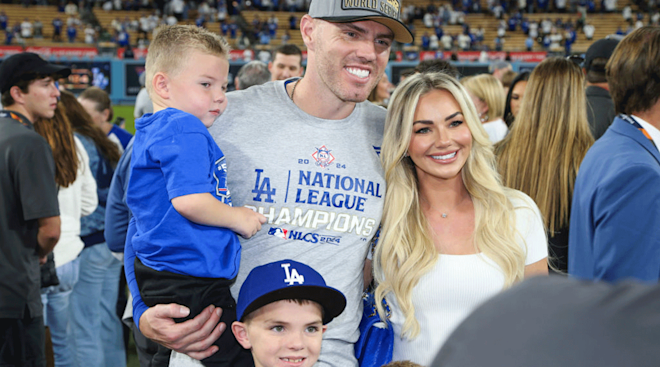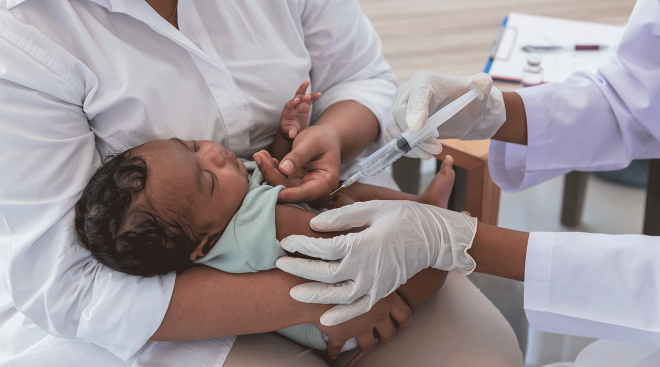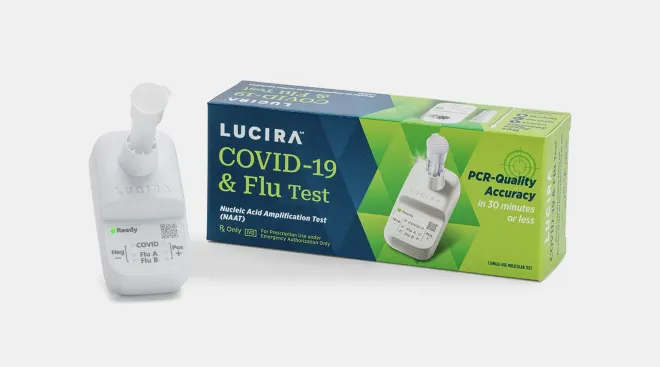What Chrissy Teigen Wishes People Knew About Type 1 Diabetes
For years, Chrissy Teigen has won over millions of fans with her honest, open and often hilarious takes on life and parenting. But behind the funny stories and seemingly effortless family life with her husband, John Legend, Teigen—like many parents—is working her absolute hardest every single day to give her four kids the best.
A self-proclaimed perfectionist with a strong partnership and plenty of resources, Teigen thought she could prepare for almost anything that might come her way. But, as it often does, life threw a curveball she never saw coming.
“We didn’t know what to expect. We were thrown into it so wildly, so fast, and we weren’t given time,” Teigen says of the moment her six-year-old son Miles was diagnosed with Type 1 diabetes. Despite her meticulous planning and the love and support of her village, the frantic rush to understand and manage Miles’ condition was anything but straightforward.
Now, Teigen is using her voice to help other parents prepare and navigate life as a parent of a child with Type 1 diabetes. Below, in an exclusive interview with The Bump, she shares the emotional realities of living with Type 1 diabetes, debunks common myths and explains why she’s advocating for early screening. Read on for her heartfelt reflections and why early action can make all the difference.
The Bump: Miles’ Type 1 diabetes diagnosis came as a shock, much like it does for many kids. What began as a routine hospitalization for an illness quickly revealed diabetes as the unexpected culprit. Can you share more about what that moment was like?
Chrissy Teigen: We make no secret about us being on a journey with this. We didn’t know what to expect. We were thrown into it so wildly, so fast, and we weren’t given time. It’s not like being pregnant. You get nine months, you’re buying the baby books, you’re buying the crib, you’re getting everything ready for the baby’s arrival. This just arrives. It doesn’t even arrive. It’s just here and you have to take it on.
TB: How have you worked to communicate with Miles about his diagnosis since the beginning? What do you want him to truly understand and feel when you talk with him?
CT: You always want your kids to feel empowered and strong, knowing they have a support system around them. There will be questions and frustrating days—for him, mostly—but if he knows he’s surrounded by people who are doing their best to make sure he feels loved and cared for, that’s what matters most to us. It was important for him to understand that we’re all on this journey together. Mistakes will be made—and they are made all the time—and sometimes we’ll have questions ourselves, but we’ll figure it out as best we can together.
That’s why I’m so grateful to work with Sanofi and be a spokesperson for Screen for Type 1. I know Miles gets excited when he sees someone else with a device on them. He’ll say, “Whoa, they have T1D! They’re in the ocean all day, or work on a boat, or are a professional soccer player or a singer.” He realizes it’s possible to do amazing things while living with this. Now, I tell him he could be a support system for others, and he’s so proud of that. We get to be part of this wonderful, inspiring, and supportive community, and it chokes me up just thinking about it. It’s truly amazing.
TB: How did you come to partner with Sanofi and Screen for Type 1, and what difference do you think early screening—and knowing about Miles’ diagnosis sooner—could have made?
CT: I’m a big advocate for finding out anything you can as early as possible when it comes to mammograms, when it comes to colonoscopies, everything, I’m the kind of person that I understand that there’s a lot of fear for people getting screened for things, but I’m the kind of person that just wants to know, I couldn’t believe that this test existed because I did not know about it until goodness many months into his diagnosis. And I wasn’t even told to screen the other kids when Miles was diagnosed, which that part shocks me the most.
It’s so important for people to know they can go to Screen for Type 1 and advocate for themselves. Talk to your doctors about screening—it really is a huge deal to find out early. For us, even a week earlier, much less a year or something, would have made a world of difference. Miles was diagnosed at the hospital, and then we came home for just a moment before we had to round up the troops and go to Children’s Hospital LA. All of a sudden, we had an orange, ten needles, and our phones out, trying to record everything for an injection that had to be done that day.
Then, you’re fearful doing it because you’re thinking, “I just learned this a second ago. I haven’t practiced on the orange as much as I think I should have.” Everyone’s worried. Of course, we had help around us, and you want everyone to feel empowered to take care of him and not be fearful. But more time would’ve lessened that fear because you can make all the mistakes you want on a little orange and on your own finger. But when you’re making those mistakes on your son, who’s just learning about this and is suddenly being poked and prodded all day, you don’t want to make those mistakes on him. You want to get it right. It would’ve been so nice to have known earlier.
TB: I can’t imagine how exhausting all of this was and continues to be. Many parents talk about the emotional toll of chronic illness. How do you manage this, and what’s your advice to other parents?
CT: I spend a lot of time being grateful that we have so many good people to reach out to and that I do have a platform. For example, yesterday I went online and said, “Guys, Miles has scars and rashes all over his arms. I’m looking for help,” and to get answers back immediately from hundreds, if not thousands, of people living with Type 1 Diabetes. I’m so grateful for that. I spend a lot of my time being really thankful for the community, and I try not to focus on any hardships John and I might have, because when I look at Miles, I just know this is such a different life for him.
There are good days, bad days, really bad days, and okay days—and that’s all more on him. This sounds like a therapy thing, but I don’t really think about how tough it is. Because if I did, I wouldn’t be able to deal with everything else our household has going on—four dogs, three other kids besides Miles, and so much going on all the time. So I try to just be amazed by the fact that Miles has taken this on so well, and that some days he won’t do it well—and that’s okay. We’re all in this together. John and I are really good about quietly leaning on each other and being able to rely on one another. “Whew, that was a day,” or “That was tough.” But with a family that has so many moving parts, it’s really hard to dwell on anything for too long.
TB: Aside from early screening, are there any misconceptions about Type 1 diabetes that you’d like to clear up?
CT: I would say a lot of people like to ask about diet, and I think that’s really interesting. Type 1 and Type 2 are often mixed up, and I also think many people assume Type 1 can be managed by just popping a Starburst in your mouth. I’ll be the first to admit, I had no idea about Type 1 Diabetes at all going into this. That’s why it would’ve been great to have had some time to learn about it beforehand. But I definitely thought it was something like—you look at your friend one day, and they seem a little tired or groggy, and you might prick their finger, test the blood, see a number, and if it’s too low, they eat a Starburst or have some Skittles.
I had no idea how all-encompassing it is for both the person living with it and their family. It affects so much of Miles’ day. If there’s a birthday party in his class and they have cupcakes, he has to go to the school nurse to get access to a phone that doses him for that cupcake, while everyone else just throws it in their mouths.
I wish people understood how different this life is. It’s not a simple thing, and there’s a reason they’re called Type 1 warriors—they have to manage so much. I have friends who’ve had it for 30, 40 years, diagnosed at five or six, and they’ve seen all the incredible advances in the medical field that have made their lives so much easier. So the fact that we can screen early now is just another one of those advancements. It’s going to be so beneficial for so many families to find out early. It’s such a cool thing to be able to talk about and advocate for.
You can learn more about Type 1 diabetes and early screening at ScreenForType1.com.
Please note: The Bump and the materials and information it contains are not intended to, and do not constitute, medical or other health advice or diagnosis and should not be used as such. You should always consult with a qualified physician or health professional about your specific circumstances.
Navigate forward to interact with the calendar and select a date. Press the question mark key to get the keyboard shortcuts for changing dates.






















































